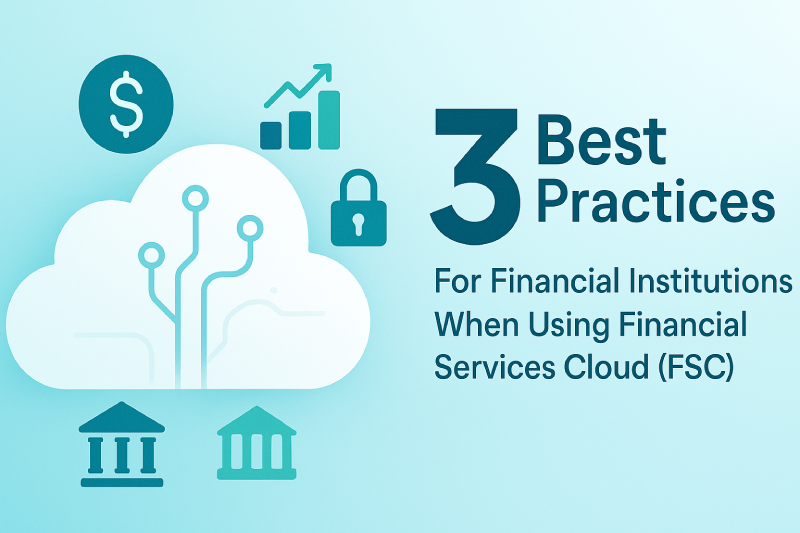
07 Aug 3 Best Practices When Using Financial Services Cloud (FSC)
Whether you’re already using Salesforce Financial Services Cloud (FSC) or thinking of implementing it, this article is for you! FSC is a powerful Salesforce CRM solution specifically designed for Financial Institutions such as Banks, Credit Unions, Wealth Management Companies, Insurance Companies, and more. In this post, we explore three key best practices to adopt in order to maximize the benefits of using FSC, from data management, deduplication, to using record rollups.
1. Maintain a Clean and Structured Data Model
Financial institutions often pull data from multiple sources such as core financial systems, online forms, and website traffic. Without a structured approach, this can lead to data inconsistencies and inefficiencies inside of Salesforce FSC, making your reporting metrics less transparent.
The best practice is to establish a well-documented data model that maps external system tables and fields to Salesforce objects.
Recommended Actions:
- Maintain a data source chart that visually represents where data originates and how it flows into Salesforce.
- For example, if you are integrating your external core system with Salesforce, are you using a middleware such as Mulesoft to bring the data into Salesforce? How frequently does your integration sync (real-time, every 15 mins, etc.)?
- Create a detailed data mapping document that defines how each data field in an external system corresponds to Salesforce fields.
- For example, your external core system might store fields related to financial products on a “Client” table, but you will want to map these fields to the “Financial Account” object in FSC designed specifically to show you the Financial Accounts & Products that an individual or corporate client has.
- Implement data validation rules to ensure data integrity and consistency across multiple sources.
- When bringing data into Salesforce from multiple external systems, you want to make sure to have strong data validation rules in place. When it comes to an external core system, a field in Salesforce will be designated as a unique identifier to avoid creating duplicate records such as a Client Number or Member Number field.
By maintaining a structured data model, financial institutions can prevent data discrepancies, streamline reporting, and enhance customer insights.
2. Implement a Deduplication Flow to Avoid Duplicate Records
Duplicate records can cause confusion for teams using Salesforce and inaccuracies in customer data. A common issue occurs when new Leads are created in Salesforce (manually or through online forms) and later converted into Accounts and Opportunities, resulting in duplicate Account records instead of merging into existing records.
Recommended Actions:
- Use Salesforce Duplicate Rules and Matching Rules to identify and prevent duplicate record creation.
- Matching Rules allow you to create a custom logic to identify duplicate records such as having a match on “Last Name” AND (“Email” or “Mobile”) AND “Mailing State/Province”.
- Duplicate Rules use Matching Rules to identify duplicates and then flag those duplicate records. When the duplicate component is added on a Lead / Account / Contact page, and a duplicate is flagged, Salesforce gives you the option to merge duplicate records.
- Leverage Flow automation to check for existing records before creating new ones.
- A deduplication flow can be used upon Lead Conversion to flag if the new Account created is a duplicate of an existing Client/Member account. The flow can also merge the data from the Converted Lead to the existing Client/Member account.
- Establish a data stewardship process where designated users review and merge potential duplicates regularly.
- Creating a report based on identified duplicates by Salesforce and potential duplicates can facilitate this task for the designated users.
With a well-defined deduplication process, financial institutions can ensure data accuracy and maintain a single source of truth for each customer.
3. Leverage FSC Rollup Fields for Financial Insights
Salesforce FSC provides robust and industry-specific rollup fields that allow financial institutions to aggregate financial data from Financial Accounts and display relevant insights on the Account record. These rollups help advisors and relationship managers get a consolidated view of a client’s financial standing without manual calculations.
Recommended Actions:
- Utilize standard FSC record rollup fields to aggregate balances, transactions, and account information on the Account record.
- These fields can be added through the standard Page Layout functionality or through Lightning Pages using dynamic forms to create a more customized panel view.
- Use Rollup Helper or Declarative Lookup Rollup Summaries (DLRS) to create custom rollups when standard rollups do not meet business needs.
- If you need more customizable rollups and the ability to use filters, Rollup Helper and Declarative Lookup Rollup Summaries (DLRS) are two effective solutions that can be used to create new rollup fields that fit your business model.
- Configure Reports and Dashboards that leverage these rollup fields to provide real-time insights into customer financials.
- Common examples of reports include Top Financial Product, Top Deposit Accounts, At Risk Clients/Members, Referral Performance, Branch Productivity, etc.
By effectively using rollups, financial institutions can enhance reporting, improve decision-making, and provide a better client experience.
Conclusion
Implementing best practices in data management, deduplication, and rollups within Salesforce Financial Services Cloud is essential for financial institutions looking to optimize their operations. By maintaining a structured data model, preventing duplicate records, and leveraging FSC rollups, institutions can ensure data accuracy, improve efficiency, and provide better financial services to their clients.
At Offprem Technology, our Salesforce experts specialize in helping financial institutions get the most out of FSC. Reach out to contact@offprem.tech to schedule a call!
